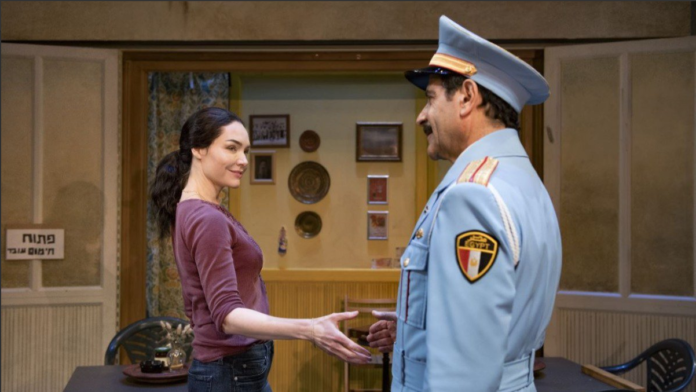In a rare moment in Israel’s fractious relationship with the “liberal” media, the Jewish state was riding high this week in the pages of The New York Times and other publications, all thanks to a quintessentially Israeli musical that cleaned up at this year’s Tony Awards.
When all was said and done, The Band’s Visit, which premiered to American audiences off-Broadway in December 2016 and came to its current Broadway home at the Ethel Barrymore Theatre almost a year later, won 10 Tonys, including the “big six” of Best Musical, Best Score, Best Book, Best Performance by a Leading Actor, Best Performance by a Leading Actress and Best Direction — one of only four musicals to have ever done so.
The 72nd Tony Awards on June 10 were indeed Israel’s turn on the stage, a somewhat odd circumstance given that The Band’s Visit has little to do with politics. Nothing, in fact, about war or peace is overtly mentioned in the situational and bittersweet comedy. If anything, it’s a love song to the power of music to cut through religious and ethnic barriers.
Adapted from an Israeli film that hit screens in 2007 — and was Israel’s original entry in the Foreign Language Film category in the 80th Academy Awards until the Academy of Motion Picture Arts and Sciences deemed it ineligible because its dialogue was more than 50 percent English — The Band’s Visit tells the story of a fictional Egyptian army band invited to play at the opening of an Arab cultural center in Petach Tikva outside Tel Aviv.
When their transportation fails to pick them up at Ben Gurion International Airport, they turn to the public bus line. But because there is no “p” sound in Arabic, they end up getting dropped off at Beit Hatikvah, a backwater development town in the middle of the desert, and hilarity ensues.
The fictional Beit Hatikvah — the name translates to “house of hope” — is devoid of culture, a jarring idea to many American Jews who have grown up with Jerusalem’s heavy spiritualism and Tel Aviv’s cosmopolitanism as the quintessential guideposts to Israeli life. But the reality is that much of Israel is like Beit Hatikvah, full of lower middle-class families struggling to get by and yearning for something more, for love, for adventure, for a better life. When the wind sweeps in the Arab musicians, a handful of locals embark on a night full of passion, regret and even hope.
In some ways, it’s the Arabs who become the town’s saviors, making the production an odd choice for Israel’s diplomatic missions in New York, which decided to celebrate the Jewish state’s 70th anniversary last month by renting out an entire production at the Barrymore. My wife and I were there that night, alongside Israeli Ambassador to the United Nations Danny Danon, Consul General Dani Dayan and hundreds of other supporters of Israel in the American-Jewish community. No one, though, seemed uncomfortable with the subject matter. Perhaps that’s because the townspeople of Beit Hatikvah were also the saviors of the Arabs, providing them with shelter and directions.
I view the production, however, as sounding an altogether different note. Unrequited love between a Jewish Israeli and an Arab musician might make for a romantic score, but I don’t hold up such a relationship as an ideal to celebrate. And neither does The Band’s Visit.
In the end, both lead characters realize the folly of their fantasy; so if Beit Hatikvah is to represent Israel and the musicians are to represent the Arab world, the musical actually is saying that the Jewish state and its Arab neighbors can and should get along, but they shouldn’t go about feathering a shared nest.
The problem with achieving Middle East peace has always been the failure of policymakers and societies to inculcate a process whereby individual human beings on either side could view each other as they are: possessing the same wants and desires, but nevertheless different when it comes to their respective cultures. Far from requiring the kind of top-down pronouncements that summits, handshakes and treaties that have made up the bulk of international diplomacy, this kind of peacemaking needs human-to-human interactions and shared respect.
Such interactions are hard, as well as frightening. But the winds of change 70 years ago threw very different peoples together in a very small space. It’s time that everybody started to get to know one another.
Joshua Runyan is the editor-in-chief of the Jewish Exponent. He can be reached at jrunyan@jewishexponent.com.


























